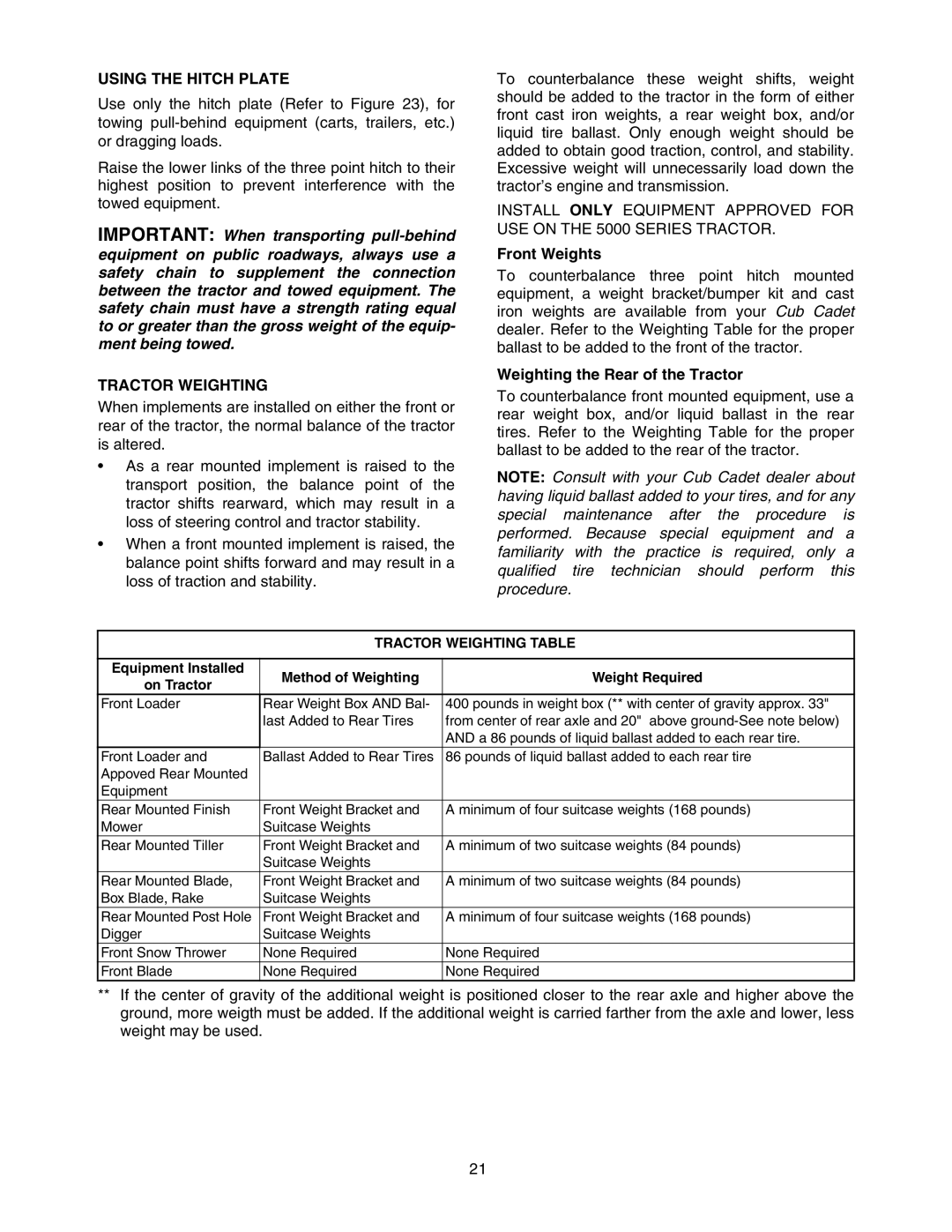
USING THE HITCH PLATE
Use only the hitch plate (Refer to Figure 23), for towing
Raise the lower links of the three point hitch to their highest position to prevent interference with the towed equipment.
IMPORTANT: When transporting
TRACTOR WEIGHTING
When implements are installed on either the front or rear of the tractor, the normal balance of the tractor is altered.
•As a rear mounted implement is raised to the transport position, the balance point of the tractor shifts rearward, which may result in a loss of steering control and tractor stability.
•When a front mounted implement is raised, the balance point shifts forward and may result in a loss of traction and stability.
To counterbalance these weight shifts, weight should be added to the tractor in the form of either front cast iron weights, a rear weight box, and/or liquid tire ballast. Only enough weight should be added to obtain good traction, control, and stability. Excessive weight will unnecessarily load down the tractor’s engine and transmission.
INSTALL ONLY EQUIPMENT APPROVED FOR USE ON THE 5000 SERIES TRACTOR.
Front Weights
To counterbalance three point hitch mounted equipment, a weight bracket/bumper kit and cast iron weights are available from your Cub Cadet dealer. Refer to the Weighting Table for the proper ballast to be added to the front of the tractor.
Weighting the Rear of the Tractor
To counterbalance front mounted equipment, use a rear weight box, and/or liquid ballast in the rear tires. Refer to the Weighting Table for the proper ballast to be added to the rear of the tractor.
NOTE: Consult with your Cub Cadet dealer about having liquid ballast added to your tires, and for any special maintenance after the procedure is performed. Because special equipment and a familiarity with the practice is required, only a qualified tire technician should perform this procedure.
TRACTOR WEIGHTING TABLE
Equipment Installed | Method of Weighting | Weight Required | |
on Tractor | |||
|
| ||
Front Loader | Rear Weight Box AND Bal- | 400 pounds in weight box (** with center of gravity approx. 33" | |
| last Added to Rear Tires | from center of rear axle and 20" above | |
|
| AND a 86 pounds of liquid ballast added to each rear tire. | |
Front Loader and | Ballast Added to Rear Tires | 86 pounds of liquid ballast added to each rear tire | |
Appoved Rear Mounted |
|
| |
Equipment |
|
| |
Rear Mounted Finish | Front Weight Bracket and | A minimum of four suitcase weights (168 pounds) | |
Mower | Suitcase Weights |
| |
Rear Mounted Tiller | Front Weight Bracket and | A minimum of two suitcase weights (84 pounds) | |
| Suitcase Weights |
| |
Rear Mounted Blade, | Front Weight Bracket and | A minimum of two suitcase weights (84 pounds) | |
Box Blade, Rake | Suitcase Weights |
| |
Rear Mounted Post Hole | Front Weight Bracket and | A minimum of four suitcase weights (168 pounds) | |
Digger | Suitcase Weights |
| |
Front Snow Thrower | None Required | None Required | |
Front Blade | None Required | None Required |
**If the center of gravity of the additional weight is positioned closer to the rear axle and higher above the ground, more weigth must be added. If the additional weight is carried farther from the axle and lower, less weight may be used.
21
